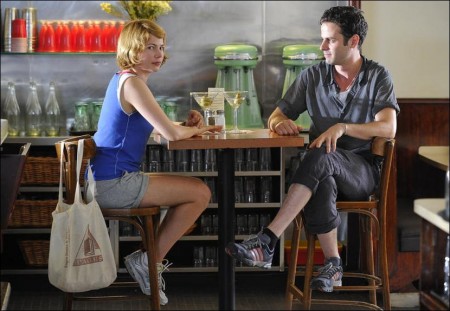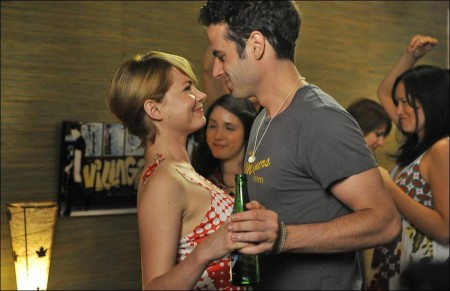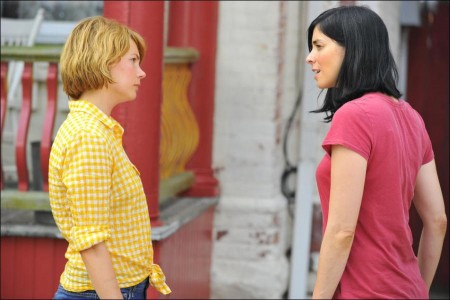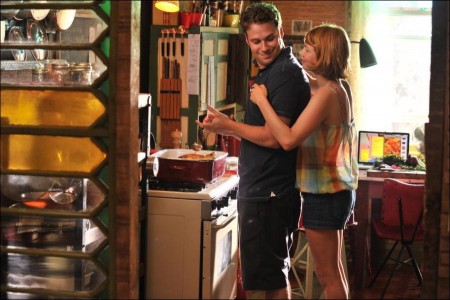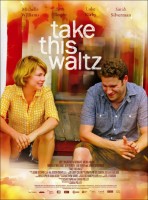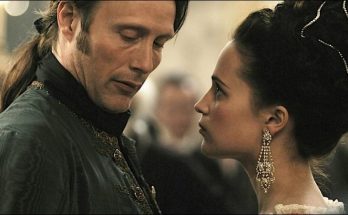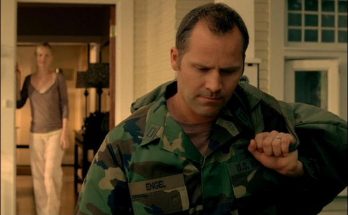Margot, a freelance writer, meets Daniel, an artist and rickshaw operator, while on a business trip, and although they immediately share some chemistry, she reveals to him that she is married. However, it turns out that Daniel is living across the street from Margot and her husband Lou in Toronto.
Although Lou and Margot appear happy together, it becomes clear that Margot is not completely satisfied with her marriage, possibly aggravated by encountering Daniel. As the film progresses Margot and Daniel interact more and more until she ultimately leaves her husband to be with him. Lou is saddened, yet understanding.
The audience is then shown a montage of Margot’s new life with Daniel, including several brief sex scenes, though it is clear that she begins to regret leaving her husband. Geraldine, Lou’s sister and a recovering alcoholic, confronts Margot (while drunk) and tells her that she should have just accepted that life has gaps and that changing relationships was not the answer.
The resolution is shown in a very subtle and rather metaphoric way. She goes to the same attitude that she used with her husband, holding him by the back and trying hard to get close to him. While we do not see Daniel’s face anymore, it is implicit that she is better alone going around and around seemingly happy in the game of life.
Take This Waltz is a 2011 Canadian drama film. The film centres on Margot, a 28-year-old freelance writer who lives in a charming house on a leafy street in Toronto’s Little Portugal neighbourhood, as she struggles with and examines her feelings for Lou, her husband of five years, while exploring a new relationship with Daniel, an artist and rickshaw driver who lives across the street. The film was written, produced, and directed by Sarah Polley. The cast includes Michelle Williams, Seth Rogen, Sarah Silverman, and Luke Kirby.
Pre-production, filming and post-production took place in 2010/2011 at locations in and around Toronto Ontario including at Pinewood Toronto Studios, Pearson International Airport, the Royal Cinema and in Louisbourg, Nova Scotia. The film also served as Sarah Silverman’s first time in which she appears on screen fully nude.
During press interviews Silverman stated that she was “Very comfortable being nude on camera because it was not intended to be sexual at all, unlike men, women have no problem being naked in front of each other in a shower situation and can just carry on a normal conversation which is what Sarah Polley the film’s director was trying to convey.”
Film Review for Take This Waltz
Five years ago, the actress Sarah Polley made an impressive debut as writer-director with Away From Her, an adaptation of her fellow Canadian Alice Munro’s superb New Yorker story The Bear Came Over the Mountain. It’s about a professional couple in rural Ontario who, after 44 years of marriage, have to come to terms with the wife developing Alzheimer’s disease, and it brought a well-deserved Oscar nomination to Julie Christie. Polley’s second film, Take This Waltz, based on her own original screenplay, also involves the confrontation of a crisis in a Canadian marriage but this time featuring a much younger couple. The result is equally remarkable and immensely moving.
The film is seen almost entirely from the point of view of Margot, a 28-year-old freelance journalist, and Michelle Williams, one of the cinema’s most versatile performers (her recent roles have included a troubled working-class woman in Blue Valentine, Marilyn Monroe in My Week With Marilyn and a pioneer wife in the realistic western Meek’s Cutoff) brings an extraordinary depth and complexity to the character.
She’s been married for five years to Lou (Seth Rogen touching in one of his more serious films), a cheerful, humorous, slightly overweight cook currently writing a book on different ways of preparing chicken, and they live in the attractive Portugal Village in downtown Toronto, a distinctively old-fashioned, quasi-bohemian area far removed in tone from the gleaming skyscrapers that define the appearance of Canada’s largest and most prosperous city.
But the film begins elsewhere, in a much older part of the country, Louisbourg, an early 18th-century French settlement in Nova Scotia, now largely a colourful holiday resort, which Margot is visiting to write material for a travel brochure. This subtle, carefully staged, highly detailed opening sets the emotional and thematic scene for the rest of the film. Attending a historical re-enactment of an early colonial settler being paraded by the militia and humiliated for adultery, Margot is invited to whip the offender. When she hesitates, a handsome young man in the crowd urges her on.
They meet again on a plane returning to Toronto and exchange the kind of intimate talk strangers often enter into with the expectation of never meeting again, even if perhaps they secretly hope to. She’s been brought on to the plane in a wheelchair and she says this is due to her phobia about travelling. It’s not a fear of flying but of being scared of connections, being lost in some empty terminal, of “being in-between things”.
By a stroke of coincidence or an act of fate, it turns out that this attractive, mysterious stranger lives in her street, having recently moved in. He’s Daniel (Luke Kirby), an artist who’s been making sketches in Louisbourg and supports himself by taking people around Toronto in a rickshaw. Given the city’s climate, that would seem to be a seasonal occupation and fortunately this is a particularly long, hot summer. Everyone is relaxed and dressed down (though on a slightly formal occasion Margot dresses up in a revealingly girlish gingham dress) and gradually a relationship springs up between Daniel, the artist who’s fearful of exhibiting, and Margot, the writer who doesn’t know what to write about.
This is in effect a modern version of Brief Encounter in a society where the constraints may be different (no one will be paraded around the town labelled as an adulterer), but the emotional and ethical risks remain significant and personal. Margot is discontented with the routines her married life has fallen into, despite having in Lou a kind, tolerant, flexible man to comfort her. He’s a much less conventional figure than Celia Johnson’s husband in Brief Encounter. Lou’s large family has provided a warm, welcoming nest and in his sister, the recovering alcoholic Geraldine (Sarah Silverman), she has a witty, vulnerable confidante.
The movie proceeds by parallel events that echo each other – jokily conducted sex with Lou, for instance, is followed shortly thereafter by truly arousing virtual sex with Daniel who sits in a bar describing in erotic detail his desire for Margot. The reality of modern Toronto is contrasted with the romanticism of the idyllic recreated Nova Scotia, and the allure of the latter provokes Margot into taking the momentous decision to follow the compass of her uncertain heart. The movie cleverly builds up to an extended coda in two parts that reflects on the wisdom or otherwise of that old Sinatra standard, The Second Time Around. One part is realistic, as Lou and Margot quietly, ruefully consider what has happened to them.
The other is an elaborate montage of Margot’s transformed life, which may be going on in her mind: uninhibited sex, sometimes involving threesomes, in a grand open apartment that resembles a ballroom, through which the camera makes waltz-like swirling, 360-degree movements encompassing several seasons. This is accompanied by Leonard Cohen singing Take This Waltz, his mysterious version of Federico García Lorca’s Little Viennese Waltz, a surreal, erotic poem of love, death, longing and desire.
Take This Waltz is so truthful and honest a film that on the rare occasions it hits a false note or becomes over-explicit or sentimental, it really jars. Like the Cohen song, Polley’s movie touches on familiar feelings and evokes common experiences in a way that goes beyond what can be explained or paraphrased.
Take This Waltz (2012)
Directed by: Sarah Polley
Starring: Michelle Williams, Seth Rogen, Sarah Silverman, Luke Kirby, Jennifer Podemski, Diane D’Aquila, Vanessa Carter, Graham Abbey, Aaron Abrams, Albert Howell, Danielle Miller
Screenplay by: Sarah Polley
Production Design by: Matthew Davies
Cinematography by: Luc Montpellier
Film Editing by: Christopher Donaldson
Costume Design by: Lea Carlson
Set Decoration by: Steve Shewchuk
Art Direction by: Aleksandra Marinkovich
Music by: Jonathan Goldsmith
MPAA Rating: R for language, some strong sexual content and graphic nudity.
Distributed by: Magnolia Pictures
Release Date: June 29, 2012
Hits: 92
